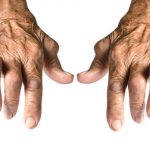 June is National PTSD Awareness month. More specifically, June 27th is PTSD awareness day. This is a condition stemming from a tragedy that leaves an impact on a person’s life. About 60 percent of men and 50 percent of women are expected to experience a traumatic event at least once in their lifetime. So, to better your understanding of this disorder, we have compiled a list of articles on PTSD symptoms and treatment tips. We have also included information on dementia and rheumatoid arthritis as an added bonus.
June is National PTSD Awareness month. More specifically, June 27th is PTSD awareness day. This is a condition stemming from a tragedy that leaves an impact on a person’s life. About 60 percent of men and 50 percent of women are expected to experience a traumatic event at least once in their lifetime. So, to better your understanding of this disorder, we have compiled a list of articles on PTSD symptoms and treatment tips. We have also included information on dementia and rheumatoid arthritis as an added bonus.
Post-traumatic stress disorder (PTSD) symptoms may develop in elderly who have had serious falls: Study
Post-traumatic stress disorder (PTSD) symptoms may develop in elderly who have had serious falls. Lead author Nimali Jayasinghe explained, “Anyone who goes through an accident in which they feel their life may be in danger or they could get physically harmed can develop post-traumatic stress symptoms.”
The patients were assessed using the Post-Traumatic Stress Scale, which measures 17 symptoms of PTSD. Background information was also collected including marital status, previous mental health issues, details about their fall, and current health conditions. The majority of patients fell in their homes and received help within an hour.
Advertisement
Women, unemployed individuals, and those with less education were more likely to experience PTSD after a fall. Furthermore, PTSD was associated with other health conditions. The most common PTSD symptom reported was feeling emotionally unstable when being reminded of their fall, a change in future hopes, and problems falling or staying asleep. Continue reading…
 PTSD-related nightmare treatment may be effective with blood pressure drugs: Study
PTSD-related nightmare treatment may be effective with blood pressure drugs: Study
PTSD-related nightmare treatment may be effective with blood pressure drugs. For the study, the researchers investigated 12 prazosin studies, of which four were randomized controlled trials.
The principal investigator of the study Simon Kung explained, “The studies showed the drug was well-tolerated and can take effect rapidly, within days to weeks, and some patients reported a return of nightmares when the course of prazosin was stopped. There’s not much available for treating nightmares in terms of medications, so prazosin is a promising option.”
“Because of the low side effects of prazosin as reported in these studies, it seems logical to extend the use of prazosin to non-PTSD nightmares,” Dr. Kung added. Continue reading…
 PTSD treatment, antidepressants linked to increased risk of dementia
PTSD treatment, antidepressants linked to increased risk of dementia
Experiencing an exceptionally traumatic event can lead to mental health issues. It can result in flashbacks, nightmares, and severe anxiety that affects the quality of life of the individual and their overall well-being. The most serious of the trauma-inducing mental disorder is post-traumatic stress disorder (PTSD), which can last for months or even years after the inciting incident, interfering with day to day functioning. New research suggests that this disorder is a significant risk factor for developing dementia, a leading cause of serious illness, disability, and death.
PTSD symptoms traditionally begin within a month of the traumatic event but can occur years after in rare instances. Symptoms often result in significant problems in social or work situations as well as relationships. PTSD symptoms can be grouped into the following four types: Continue reading…
 Yoga may help combat depression, PTSD, and anxiety in seniors
Yoga may help combat depression, PTSD, and anxiety in seniors
Yoga may help combat depression, post-traumatic stress disorder (PTSD), and anxiety in seniors. Yoga continues to grow in popularity and for good reason, too. Yoga has been found to provide multiple benefits such as improving flexibility and strength along with reducing stress and anxiety.
For the study, researchers analyzed 13 literature reviews accounting for 185 articles. The researchers found that yoga has the potential to offer benefits to those suffering from PTSD, anxiety, and depression.
Advertisement
Coauthor Leslie Roach said, “Even though I do think yoga is, in general, incredibly beneficial, I also think there needs to be a whole lot more education about how to use yoga specifically to treat survivors of trauma in order to be the most effective and helpful. So as a standalone treatment right now, it’s just not viable. However, I think with more education, more research, and more experienced instructors, it will be.” Continue reading…
 Rheumatoid arthritis risk in women with post-traumatic stress disorder (PTSD) higher, study shows
Rheumatoid arthritis risk in women with post-traumatic stress disorder (PTSD) higher, study shows
Rheumatoid arthritis (RA) risk is higher among women with post-traumatic stress disorder (PTSD), according to research. PTSD is a condition resulting from a stressful or traumatic experience and is characterized by intrusive memories of the event, increased arousal, avoidance of experiences associated with the traumatic event, and loss of interest in activities and relationships.
To uncover the association between PTSD and rheumatoid arthritis and the role of smoking, researchers looked at 49,693 women enrolled in the Nurses’ Health Study II. Participants completed questionnaires about lifestyle, health practices, and other conditions at baseline and then every two years throughout the course of the study. Study participants completed the Brief Trauma Questionnaire and a PTSD screener to identify whether and when trauma and PTSD symptoms may have occurred. Participants did not have rheumatoid arthritis or lupus. Continue reading…
